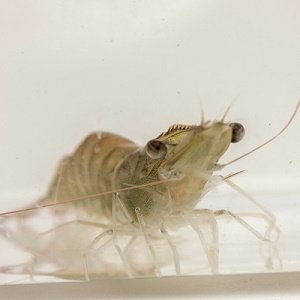
Diseases pose a major threat to the shrimp farming industry. Intensified aquaculture practices and changing climates create ideal conditions for pathogens to spread, causing significant economic losses. Fortunately, new research is shedding light on a promising solution: immunostimulants.
A team of researchers from IPB University (Indonesia) conducted a study to investigate the immunostimulant efficacy of plant, algae, and fungal extracts on the survival, growth, and immune response of shrimp from the Penaeidae family using a meta-analysis approach. They then identified potential natural immunostimulant ingredients that positively influenced shrimp survival, growth, and immune response.
The Challenge of Diseases in Shrimp Farming
Global trade, denser shrimp populations, and climate change are leading to an increase in shrimp diseases. Intensive aquaculture systems, while productive, facilitate the spread of these diseases. Extreme climates, such as storms, droughts, and high temperatures, further stress shrimp and weaken their immune systems.
What are Immunostimulants?
Immunostimulants are natural substances that act as enhancers of the shrimp’s defense system, boosting their ability to fight infections. Unlike traditional vaccines that target specific diseases, immunostimulants broadly enhance the shrimp’s natural defenses, making them more resistant to a wider range of threats.
Natural products, particularly extracts from plants, algae, and fungi, are promising as immunostimulants. These extracts offer several benefits beyond disease resistance, including stress reduction, improved growth, and appetite stimulation.
Various studies have shown that several immunostimulants can significantly enhance the immune response of shrimp. They work by boosting key components of the immune system such as lysozyme, complement, and phagocytosis, which play a crucial role in fighting infections.
Why Natural Immunostimulants are Game Changers?
- Sustainable Solution: The overuse of antibiotics has led to antibiotic resistance in bacteria. Natural immunostimulants offer a safe and eco-friendly alternative to promote shrimp health.
- Broader Defense: By strengthening the overall immune system of shrimp, immunostimulants can combat a variety of pathogens, not just a specific disease.
- Stress Relief: Environmental factors such as storms and temperature fluctuations can weaken the shrimp’s immune response. Natural immunostimulants can help alleviate stress and keep shrimp healthy and thriving.
New Study Delves Deeper
The researchers conducted a comprehensive meta-analysis of existing studies to understand the efficacy of natural immunostimulants derived from plants, algae, and fungi. They focused on shrimp from the Penaeidae family, a commercially important group. The study aimed to:
- Evaluate efficacy: How well do these natural immunostimulants improve shrimp survival, growth, and immune response?
- Identify key ingredients: Can specific components within these extracts be identified as responsible for the positive effects?
- Understand influencing factors: Dosage, extraction methods, and delivery techniques—how do these variables affect outcomes?
The Results
The meta-analysis revealed several key findings:
- Overall effectiveness: Immunostimulants significantly improved survival rates, growth, and immune response in shrimp from the Penaeidae family (common farmed shrimp).
- Algae lead the way: Among different sources, algae-based immunostimulants demonstrated the most positive effects across all three health parameters.
- Extraction matters: The way these natural ingredients are extracted significantly affects their effectiveness. Ethanol-based extraction proved to be the most successful method.
- Delivery methods: Interestingly, the method of delivery (e.g., in feed, water) did not significantly affect overall outcomes.
- Protection against pathogens: Immunostimulants improved the immune response, survival, and growth of shrimp against various disease-causing pathogens.
- Finding the sweet spot: Dosage is crucial. Algae treatments were most effective at lower doses, while fungi-based options performed better at higher doses.
Conclusion
The findings of this study are very promising for the future of shrimp aquaculture. By harnessing the power of natural immunostimulants, we can create a more sustainable and resilient industry, ensuring healthy shrimp populations and a thriving seafood market.
Stay Always Informed
Join our communities to instantly receive the most important news, reports, and analysis from the aquaculture industry.
Contact
Sukenda
Departement of Aquaculture, Faculty of Fisheries and Marine Sciences, IPB University
Bogor, 16680, Indonesia
Email: sukenda@apps.ipb.ac.id
Reference
Yasin Saleh, M. I., & Jayanegara, A. (2024). Survival, immune response and growth of Penaeid shrimp as affected by immunostimulants: A meta-analysis. Fish & Shellfish Immunology, 148, 109507. https://doi.org/10.1016/j.fsi.2024.109507
Editor at the digital magazine AquaHoy. He holds a degree in Aquaculture Biology from the National University of Santa (UNS) and a Master’s degree in Science and Innovation Management from the Polytechnic University of Valencia, with postgraduate diplomas in Business Innovation and Innovation Management. He possesses extensive experience in the aquaculture and fisheries sector, having led the Fisheries Innovation Unit of the National Program for Innovation in Fisheries and Aquaculture (PNIPA). He has served as a senior consultant in technology watch, an innovation project formulator and advisor, and a lecturer at UNS. He is a member of the Peruvian College of Biologists and was recognized by the World Aquaculture Society (WAS) in 2016 for his contribution to aquaculture.







